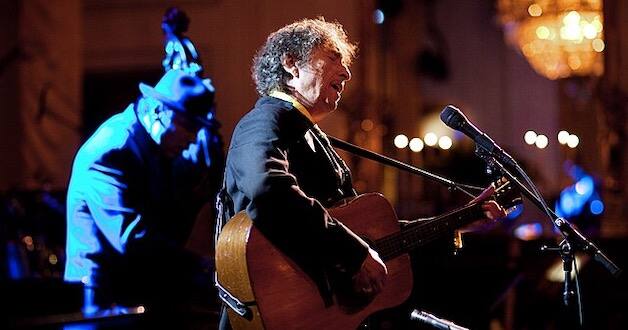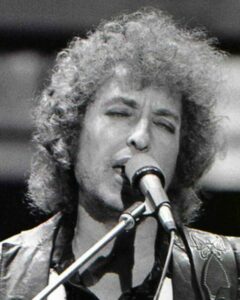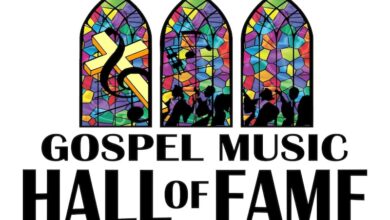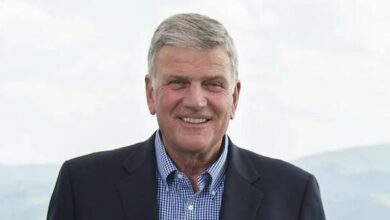“Gotta Serve Somebody”: Bob Dylan’s spiritual journey continues to unfold

Bob Dylan rocked the music world in 1979 when he released the iconic album “Slow Train Coming.” The singer who was the voice of his generation was writing about overt Christian themes, many of them apocalyptic. Fans of Christian music were ecstatic. Dylan was one of them and would become a staple on the concert circuit and contemporary Christian radio stations.
And there’s a slow, slow train comin’ up around the bend.
Now, more than 40 years later, many are wondering what happened. Is Dylan still a Christian? Did he return to his Jewish roots? Or is his spirituality, like his music, still evolving? As Dylan himself might say, the answer is blowing in the wind.
“I think Bob Dylan, in addition to being a Nobel Prize-winning musician and poet, has sort of been a chameleon all of his career,” said Mark Davidson, senior director of archives and exhibitions at the Bob Dylan Center in Tulsa. “He has had an iconic status since the early 1960s, when he was writing songs such as `Blowin’ in the Wind,’ `Like a Rolling Stone‘ and all of those early songs. He cemented his legacy early on as a poet’s poet and a musician’s musician. Since then, he has endured and changed and never stopped looking for new avenues for creativity and inspiration.”
Davidson, coauthor of the new book “Bob Dylan: Mixing up the Medicine,” recently discussed the singer’s spiritual journey with Metro Voice. Although Dylan’s conversion to Christianity may have seemed abrupt to many people, it was not out of character for him to periodically reinvent himself.
READ: Bob Dylan still telling tells of a broken world

“There have been shifts like that throughout his career,” Davidson said. “Obviously, the motorcycle accident in 1966 was one, and 1978-79 was another big one. You can argue that during the early 1990s, leading up to `Time out of Mind,’ he was going through another of these transitions. The same thing happened in the 2010s when he was doing the `Great American Songbook’ albums. It sort of was leading creatively to this new place of `Rough and Rowdy Ways’ and `Shadow Kingdom.’ It’s not so out of the blue for him to have these moments where everything changes and it’s a new direction.”
At least in retrospect, his lyrics foreshadowed his conversion.
“I think some of his direction and instrumentation during the 1978 tour leads pretty naturally to what he ends up doing when he does this deep dive into the gospel music tradition,” Davidson said. “Some of the influences were bubbling under the surface early on, the things have always been there and came out in new ways decades down the road. I think gospel music was one of them.”
The pivotal point in Dylan’s journey to Christianity came when a woman threw a silver cross onto the stage during a concert near the end of a worldwide tour in 1978, when he and his band were physically and emotionally exhausted.
“It’s a difficult story to pin down,” Davidson said. “He was talking to the audience about feeling really bad and feeling like he needed something, and someone threw a cross on the stage. In the book, we also talk about during that 1978 tour, when he started exploring gospel directions in his music. He had been working on some of the songs that would end up on `Slow Train Coming.’ From what I have seen of that 1978 world tour, it was grueling. I think by the end of it, probably Dylan and his entire band were pretty wiped out. That was an impetus for that big shift.”
Dylan later recounted his experience in dramatic terms: “Jesus put his hand on me. It was a physical thing. I felt it. I felt it all over me. I felt my whole body tremble. The glory of the Lord knocked me down and picked me up.”
He would go on to record three albums with Christian themes: “Slow Train Coming” (1979), “Saved” (1980) and “Shot of Love” (1981). The lyrics are serious and reflect a deep biblical knowledge, of both the Old and New Testaments.
“I don’t think his foray into Christianity and studying the Bible was at all superficial,” Davidson said. “We know that he was writing down verses and took it very seriously. He really studied the Bible. One thing that can be said about Dylan is that when he gets an interest in something, he doesn’t go in halfway at all. That is true of traditional folk songs, Woody Guthrie and everything he was learning in the late 50s and early 60s. Everybody says he was like a sponge.”
Throughout his career, he has absorbed what was going on around him and turned it into often profound lyrics.
“The word `genius’ is bandied around a lot, but I think one of the things Dylan has been able to do throughout his career, and it’s part of the way his brain works, is take in a lot of things very quickly, commit them to memory, absorb them and put them back out in his own way,” Davidson said. “That is evidenced through his Christian gospel period, early folk songs and country music.”
At the same time Dylan was trying to get grounded by attending Bible studies in Southern California, he also was being encouraged to go more public with his faith. Chuck Girard, founder of the seminal Christian rock band Love Song, whose story is told in the recent movie “Jesus Revolution,” crossed paths with him several times in the early 1980s.
“When everyone tried to jump on the bandwagon after the announcement of Dylan’s conversion, he remained true to character — and wisely so,” he said. “He successfully managed to stay aloof from those who would exploit him. He offered himself on his own terms and only did so when he felt led to lend his talents to some Chrisitan endeavor.”
Dylan’s spiritual path following his gospel trilogy is a matter of much debate and speculation.
“You see more of the Old Testament biblical allusions cropping up immediately after the Christian trilogy in `Infidels’,” Davidson said. “In terms of where he is now or where he has been since the early 1980s, that’s difficult for me to answer. I know that he is a very private person and really doesn’t speak on topics such as that. I think he is no less immersed in all of his thinking about the world. I don’t see Dylan as ever having shut off that part of his brain – the curiosity, the deep thinking, the self-reflection.”
“Rolling Stone” interviewed Dylan after the release of “Infidels.” “I don’t think I’ve ever been an agnostic,” he said. “I’ve always thought there’s a superior power, that this is not the real world and that there’s a world to come. That no soul has died, every soul is alive, either in holiness or in flames. And there’s probably a lot of middle ground.”
Dylan, now 82, performed two shows in Kansas City last month as part of his Rough and Rowdy Ways tour. Regardless of the spiritual content of his music at the moment, it is enough to appreciate him for his insights into the human condition and the times in which he lives. As with everyone else, faith is a journey, not a destination.
“What I know is that I’m not his judge,” Girard said. “My theology is such that I believe it to be a very difficult position to get un-born again. I know firsthand what it’s like to stumble and fall and be restored. It’s not over until it’s over, as they say. In my deepest heart of hearts, I believe that I’ll see Bob Dylan in heaven someday.”
For more information about the Bob Dylan Center, visit www.bobdylancenter.com. “Bob Dylan: Mixing up the Medicine” is available at most bookstores and online, including at Bob Dylan: Mixing up the Medicine: Davidson, Mark, Fishel, Parker: 9781734537796: Amazon.com: Books
–Alan Goforth | Metro Voice
Photos from WikiCommons 2.0 license.






